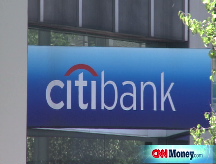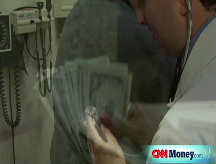Have banks finally hit bottom?
Bank stocks have been on a tear this week. But analysts say investors should be very wary before diving back into this troubled group.
NEW YORK (CNNMoney.com) -- This question seemed unthinkable just a week ago, but here goes: Have bank stocks finally hit bottom?
Nationalization fears, stress-test woes and general concerns about how much higher loan losses could rise before this recession is mercifully over have combined to whack shares of major banks this year.
But this week has been another story. The S&P Bank Index has been in the black for the past three days and was up another 12% late Thursday morning. Some of the most beaten down banks have skyrocketed.
Including this morning's gains, shares of Bank of America (BAC, Fortune 500) are up nearly 50% this week. JPMorgan Chase's (JPM, Fortune 500) stock has gained 16% while Wells Fargo (WFC, Fortune 500) has climbed 33%.
And shares of Citigroup (C, Fortune 500), which reportedly is on the verge of agreeing to give the government as much as a 40% stake in the bank, are up more than 40% this week.
Now of course, these eye-popping gains do little for anyone who's been holding on to the stocks for a while. Citi, for example, is still down nearly 60% this year and about 90% during the past twelve months.
But this week's rally makes it worth wondering if the worst is finally over for Wall Street's favorite whipping post.
Well, as encouraging as the recent upswing may be, it's hard to imagine that there won't be more volatility ahead for troubled banks.
The issue that still remains for BofA and Citi, for example, is whether the government will need to take over an even bigger chunk of those companies.
If so, the stocks could head right back down again, one investing expert said.
"The bottom is zero. And for the penny stock banks like Citigroup and Bank of America for that matter, what you are buying is not really a stock but an option," said Marc Groz, managing member of Topos, an investment advisory firm based in Stamford, Conn.
"The question is: Are these banks going to survive in their current form? Or are they going to be diluted to oblivion? If not, you win," Groz added.
To be sure, there's more to the banking sector than just Citi and BofA. Not all banks are at risk of needing new capital injections. Not all banks are in danger of being nationalized.
But in case you haven't noticed, the economy is in sorry shape right now. And until there is a sign of a recovery, most banks will probably suffer.
With that in mind, JPMorgan Chase, one of the "stronger" banks, warned Thursday that it expects losses in its home-equity loan portfolio to rise sharply this year.
So if you are going to take a gamble on any bank stock, you must, to paraphrase a popular cheerleader chant, be selective, be be selective.
"We are convinced that there are some banks you'd want to own coming out of this debacle. But our biggest problem is finding companies that are financially strong right now," said Ted Parrish, co-manager of the Henssler Equity fund.
Parrish said his fund sold stakes in Bank of America and BB&T (BBT, Fortune 500) in the past year. Currently, he owns Cullen/Frost Bankers (CFR), a Texas-based bank that decided to not apply for bailout funds last year, Bank of New York Mellon (BK, Fortune 500) and American Express (AXP, Fortune 500), which became a bank holding company last November.
Another money manager agreed that now is a good time to try and identify the long-term survivors in banking.
Blake Howells, director of equity research for Becker Capital Management, a Portland, Ore.-based institutional investment firm with about $1.6 billion in assets, said that some of the healthier banks were unfairly dumped in the past few weeks.
Howells said that when Treasury Secretary Tim Geithner unveiled plans of the new banking bailout on February 10, which included the stress test idea, the details were so vague that investors panicked.
But after Wednesday's announcement by the Treasury and bank regulators, which provided more information about the tests, it seems that investors have a much better idea of what the government actually plans to do.
"When Geithner first proposed the stress test, people didn't know what that meant. The pessimism got extreme," he said. "Now people are understanding that this may not be a pass/fail kind of test. It doesn't mean that common shareholders in most banks will be eliminated and it looks like the government is not going to nationalize the banking system."
Still, Howells also thinks investors need to be cautious. He said part of this week's rally is likely due to short covering, the phenomenon that takes place when bearish investors who bet that stocks would go down rush to buy them back as prices rise.
So instead of making a bold bet on the banks that are most frequently mentioned as nationalization targets, Howells said he's sticking with lower-risk banks that have done a better job of minimizing mortgage-related damage to their balance sheets. He owns U.S. Bancorp (USB, Fortune 500), JPMorgan Chase and TCF Financial (TCB), a regional bank based in Minnesota.
"This is the time to try and identify who some of the winners will be," Howells said. ![]()




